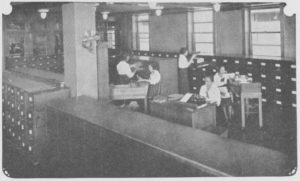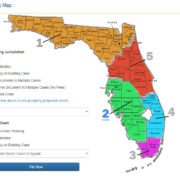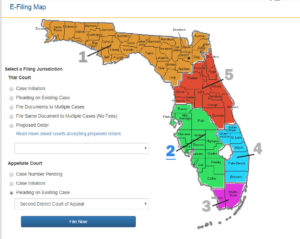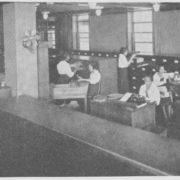Posts
Second District Clerk Shares Details About Today’s Transition to the Portal
/0 Comments/in Electronic Filing and Service, Florida Appellate Procedure, Florida's Second DCA /by DPW Legal
Happy Filing Everyone!
Today, December 14, is the day the Second District transitions to accepting filings through the statewide E-Filing Portal. The Honorable Mary Beth Kuenzel, Clerk of the Second District, kindly shared some details about what that will mean for us practitioners as we change our procedures. This information follows up on our prior blog post with information from press releases and the Florida Bar News.
The eDCA is still alive and well.
Filing will occur through the portal, but that does not mean the end of the eDCA. Practitioners can still go to the eDCA to review dockets and case information, download filed documents, and obtain briefs from other cases. In fact, practitioners can still go there to file documents–the difference is that upon clicking the link to file a document in the eDCA, the website will redirect you to the Portal filing page.
The eDCAÂ can still be practitioners’ main entry point for everything, including filing, if they so choose.
E-Service is now accomplished upon filing!
One of the advantages of filing through the statewide portal is that filing there constitutes service upon all parties for whom e-service is permitted. No longer will practitioners need to separately serve documents via email.
E-mail notifications from the court will change.
Previously, upon filing a document through the eDCA, the clerk would review the documents and the system would send out a “Casemail” e-mail notification upon the clerk entering the document on the docket.
With the Portal handling entry of documents on the docket, those “Casemail” notifications will be a thing of the past. But Clerk Kuenzel informs us that the clerk’s office will still conduct its preliminary review of all filings for compliance with rules, proper categorization, etc.
The Portal will still handle filing fees for the Second District, and will soon handle them statewide.
The Second District (as the test court for the District Courts of Appeal for Portal filing) has always been able to accept filing fees through the Portal. That will not change, so if you’ve been using the portal to pay your DCA fees, keep right on doing it. To date, however, none of the other districts have access to the Portal for filing fees. When the other four districts go live on the Portal in January, they too will be able to accept filing fees electronically.
This is a big step towards completing a long-time goal.
The Florida Supreme Court has had a long-stated goal of having a single portal in which to file in all courts in Florida. While there have been setbacks, today’s transition for the Second DCA and the upcoming transition for the other DCAs is a major step towards finally achieving that goal.
Give yourself extra time to make your first few filings.
Our office had two filings in the Second District today, and discovered an additional tip to share with you: leave yourself extra time for the first Portal filing in an appellate case. The service emails are not yet set up in the Portal, so it will take some time to add each party to be served in the Portal. Once you’ve done it once, though, it should be set up for all future filings. Happy filing!
Eleventh Circuit Rule Amendments Effective April 2, 2018
/0 Comments/in Electronic Filing and Service, Eleventh Circuit, Federal Rules, Federal Rules of Appellate Procedure, Florida Appellate Procedure, Record on Appeal, Rule Changes /by DineenThe Eleventh Circuit has made a handful of changes to its rules affecting tax practitioners, appellate mediation, and the ability of counsel coming in after an appeal has been initiated to file a replacement brief. Specifically, the rule amendments:
Without a specific rule governing replacement briefs, does this mean the Eleventh Circuit will no longer allow replacement brief practice? The answer is unclear, but I would counsel clients not to count on it.
The new rules became effective April 2, 2018.
Interesting links
Here are some interesting links for you! Enjoy your stay :)Pages
Categories
- Administrative Orders
- Amici
- Appealability
- Appeals 101
- Attorney's Fees and Costs
- Bar Activities
- Bar Governance
- Briefs
- Citations and Style
- Civil Appeals
- Criminal Appeals
- Dicta
- Electronic Filing and Service
- Eleventh Circuit
- Eleventh Circuit Rules
- Error
- Evidence
- Extraordinary Writs
- Family Law Appeals
- Family Law Appeals
- Federal Circuit
- Federal Rules
- Federal Rules of Appellate Procedure
- Federal Rules of Civil Procedure
- Final Orders
- Florida Appellate Procedure
- Florida Constitution
- Florida Family Law Rules of Procedure
- Florida Rules of Appellate Procedure
- Florida Rules of Civil Procedure
- Florida Rules of Criminal Procedure
- Florida Rules of Judicial Administration
- Florida Small Claims Rules
- Florida Supreme Court
- Florida's Fifth DCA
- Florida's First DCA
- Florida's Fourth DCA
- Florida's Second DCA
- Florida's Third DCA
- In the News
- Intellectual Property
- iPad for Appellate Advocacy
- Judges and Justices
- Jurisdiction
- Jury Instructions
- Jury Trials
- Just for Fun
- Mandate
- Mootness
- Motions Practice
- Notice of Appeal
- Oral Argument
- Original Jurisdiction
- Preservation
- Pro Bono
- Quoted
- Record on Appeal
- Rehearing and Reconsideration
- Rendition
- Reviewable Non-Final Orders
- Rule Changes
- Sanctions
- SCOTUS
- Standards of Review
- Statutory Intepretation
- Summary Judgment
- Summary Judgment
- Time
- UCCJEA
- Writ of Certiorari
- Writ of Prohibition
- Writs and Petitions



